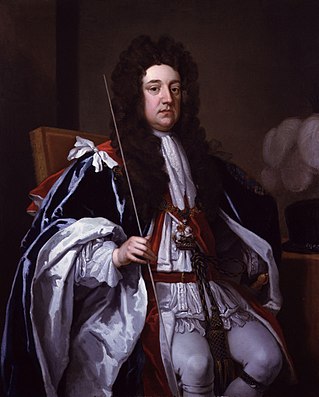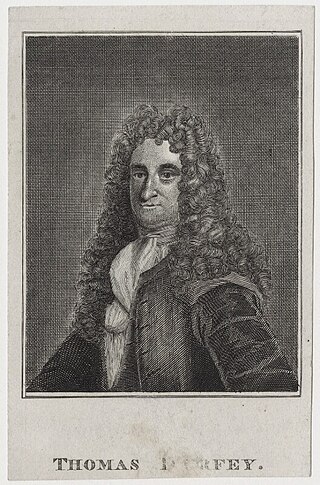Related Research Articles

Jacobitism was a political ideology advocating the restoration of the Catholic House of Stuart to the British throne. When James II of England chose exile after the November 1688 Glorious Revolution, the Parliament of England ruled he had "abandoned" the English throne, which was given to his Protestant daughter Mary II of England, and her husband William III. On the same basis, in April the Scottish Convention awarded Mary and William the throne of Scotland.
A Tory is an individual who supports a political philosophy known as Toryism, based on a British version of traditionalist conservatism which upholds the established social order as it has evolved through the history of Great Britain. The Tory ethos has been summed up with the phrase "God, King, and Country". Tories are monarchists, were historically of a high church Anglican religious heritage, and were opposed to the liberalism of the Whig party.
The Whigs were a political party in the Parliaments of England, Scotland, Ireland, Great Britain and the United Kingdom. Between the 1680s and the 1850s, the Whigs contested power with their rivals, the Tories. The Whigs became the Liberal Party when the faction merged with the Peelites and Radicals in the 1850s. Many Whigs left the Liberal Party in 1886 over the issue of Irish Home Rule to form the Liberal Unionist Party, which merged into the Conservative Party in 1912.

Algernon Sidney or Sydney was an English politician, republican political theorist and colonel. A member of the middle part of the Long Parliament and commissioner of the trial of King Charles I of England, he opposed the king's execution. Sidney was later charged with plotting against Charles II, in part based on his most famous work, Discourses Concerning Government, which was used by the prosecution as a witness at his trial. He was executed for treason. After his death, Sidney was revered as a "Whig patriot—hero and martyr".

Sidney Godolphin, 1st Earl of Godolphin, was an English Tory politician and peer. He was a Privy Councillor and Secretary of State for the Northern Department before he attained real power as First Lord of the Treasury. He was instrumental in negotiating and passing the Acts of Union 1707 with Scotland, which created the Kingdom of Great Britain. He had many other roles, including that of Governor of Scilly.
"Lillibullero" is a march attributed to Henry Purcell that became popular in England at the time of the Glorious Revolution of 1688.
The Tories were a loosely organised political faction and later a political party, in the Parliaments of England, Scotland, Ireland, Great Britain and the United Kingdom. They first emerged during the 1679 Exclusion Crisis, when they opposed Whig efforts to exclude James, Duke of York from the succession on the grounds of his Catholicism. Despite their fervent opposition to state-sponsored Catholicism, Tories opposed his exclusion because of their belief that inheritance based on birth was the foundation of a stable society.

The Exclusion Crisis ran from 1679 until 1681 in the reign of King Charles II of England, Scotland and Ireland. Three Exclusion Bills sought to exclude the King's brother and heir presumptive, James, Duke of York, from the thrones of England, Scotland and Ireland because he was a Roman Catholic. None became law. Two new parties formed. The Tories were opposed to this exclusion, while the "Country Party", who were soon to be called the Whigs, supported it. While the matter of James's exclusion was not decided in Parliament during Charles's reign, it would come to a head only three years after James took the throne, when he was deposed in the Glorious Revolution of 1688. Finally, the Act of Settlement 1701 decided definitively that Roman Catholics were to be excluded from the English, Scottish, and Irish thrones, later the British throne.
The high church are the beliefs and practices of Christian ecclesiology, liturgy, and theology that emphasize "ritual, priestly authority, [and] sacraments". Although used in connection with various Christian traditions, the term originated in and has been principally associated with the Anglican tradition, where it describes churches using a number of ritual practices associated in the popular mind with Roman Catholicism and Eastern Orthodoxy. The opposite tradition is low church. Contemporary media discussing Anglican churches often prefer the terms evangelical to low church and Anglo-Catholic to high church, even though their meanings do not exactly correspond. Other contemporary denominations that contain high church wings include some Lutheran, Presbyterian, and Methodist churches.
Charles Leslie was a former Church of Ireland priest who became a leading Jacobite propagandist after the 1688 Glorious Revolution. One of a small number of Irish Protestants to actively support the Stuarts after 1688, he is best remembered today for his role in publicising the 1692 Massacre of Glencoe.

Thomas d'Urfey was an English writer and playwright. He wrote plays, songs, jokes, and poems. He was an important innovator and contributor in the evolution of the ballad opera.
"The Vicar of Bray" is an eighteenth century satirical song recounting the career of The Vicar of Bray and his contortions of principle in order to retain his ecclesiastic office despite the changes in the Established Church through the course of several English monarchs. The song is particularly interesting because of the number of allusions to English religious and political doctrines and events crammed into it, justifying the close reading and annotation given here.

Sir Roger L'Estrange was an English pamphleteer, author, courtier and press censor. Throughout his life L'Estrange was frequently mired in controversy and acted as a staunch ideological defender of King Charles II's regime during the Restoration era. His works played a key role in the emergence of a distinct 'Tory' bloc during the Exclusion Crisis of 1679–81. Perhaps his best known polemical pamphlet was An Account of the Growth of Knavery, which ruthlessly attacked the parliamentary opposition to Charles II and his successor James, Duke of York, placing them as fanatics who misused contemporary popular anti-Catholic sentiment to attack the Restoration court and the existing social order in order to pursue their own political ends. Following the Exclusion Crisis and the failure of the nascent Whig faction to disinherit James, Duke of York in favour of Charles II's illegitimate son James, 1st Duke of Monmouth, L'Estrange used his newspaper The Observator to harangue his opponents and act as a voice for a popular provincial Toryism during the 'Tory Reaction' of 1681–85. Despite serving as an MP from 1685 to 1689 his stock fell under James II's reign as his staunch hostility to religious nonconformism conflicted with James's goals of religious tolerance for both Catholics and Nonconformists. The Glorious Revolution of 1688 and the collapse of the Restoration political order heralded the end of L'Estrange's career in public life, although his greatest translation work, that of Aesop's Fables, saw publication in 1692.
Wit and Mirth: Or Pills to Purge Melancholy is the title of a large collection of songs by Thomas d'Urfey, published between 1698 and 1720, which in its final, six-volume edition held over 1,000 songs and poems. The collection started as a single book compiled and published by Henry Playford who had succeeded his father John Playford as the leading music publisher of the period. Over the next two decades, Pills went through various editions and expanded into five volumes; in 1719 Thomas D'Urfey reordered and added to the work to produce a new edition with the title Songs Compleat, Pleasant and Divertive, published by Jacob Tonson. Volumes I and II now consisted entirely of songs with words by D'Urfey, "Set to Musick by Dr. John Blow, Mr. Henry Purcell, and other excellent masters of the town". The edition sold out quickly and in the second printing D'Urfey reverted to the Pills title. He added Volume 6 in 1720. The title itself may derive from a 1599 pamphlet "A Pil to Purge Melancholie".
The Whig Junto is the name given to a group of leading Whigs who were seen to direct the management of the Whig Party and often the government, during the reigns of William III and Anne. The Whig Junto proper consisted of John Somers, later Baron Somers; Charles Montagu, later Earl of Halifax; Thomas Wharton, later Marquess of Wharton, and Edward Russell, later Earl of Orford. They came to prominence due to the favour of Robert Spencer, 2nd Earl of Sunderland and during the reign of Queen Anne, Sunderland's son, the 3rd Earl succeeded his father. Opponents gave them the nickname "the five tyrannising lords". Other figures prominent around the edges of the Junto include Sir John Trenchard and Thomas Tollemache.

James II and VII was King of England and Ireland as James II and King of Scotland as James VII from the death of his elder brother, Charles II, on 6 February 1685, until he was deposed in the 1688 Glorious Revolution. The last Catholic monarch of England, Scotland, and Ireland, his reign is now remembered primarily for conflicts over religion. However, it also involved struggles over the principles of absolutism and divine right of kings, with his deposition ending a century of political and civil strife by confirming the primacy of the English Parliament over the Crown.

Augustan drama can refer to the dramas of Ancient Rome during the reign of Caesar Augustus, but it most commonly refers to the plays of Great Britain in the early 18th century, a subset of 18th-century Augustan literature. King George I referred to himself as "Augustus," and the poets of the era took this reference as apropos, as the literature of Rome during Augustus moved from historical and didactic poetry to the poetry of highly finished and sophisticated epics and satire.

The Loyal Parliament was the only Parliament of England of King James II, in theory continuing from May 1685 to July 1687, but in practice sitting during 1685 only. It gained its name because at the outset most of its members were loyal to the new king. The Whigs, who had previously resisted James's inheriting the throne, were outnumbered both in the Commons and in the Lords.
A History of the Early Part of the Reign of James II (1808) is a history of England during the first year of James II's reign (1685), written by the Whig MP Charles James Fox. It was left unfinished at his death in 1806 and was not published until 1808.
Cristiano Farinelli was an Italian composer and violinist. Cristiano Farinelli was a friend of the composer Arcangelo Corelli and is said by some musicologists to have been the uncle and perhaps patron of the famous castrato Carlo Broschi whose stage name was Farinelli.
References
- Thomas Babington Macaulay, History of England, Vol. I, Chapter IV
- The Percy Anecdotes (1820): Tom D'Urfey